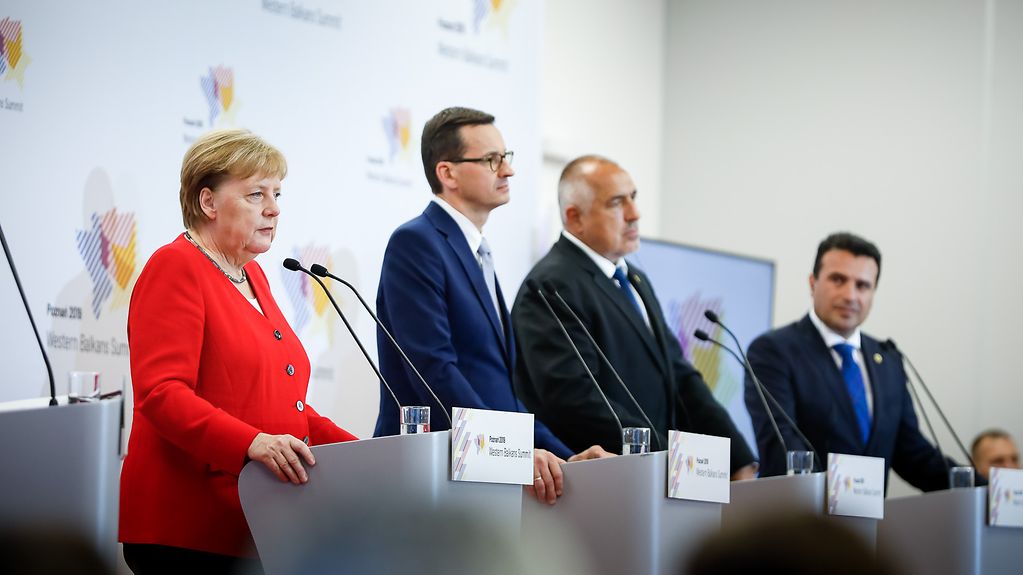Western Balkans Summit in Poznan
In Poznan, Chancellor Angela Merkel and the heads of state and government of the Western Balkan states, other EU states, and representatives of the EU have sought to identify ways to better master conflicts in the Western Balkan region through enhanced cooperation. In spite of continued political difficulties, significant progress has been made, said the Chancellor.

Chancellor Angela Merkel at a joint press conference with the prime ministers of Poland, Bulgaria and North Macedonia (left to right)
Photo: Bundesregierung/Denzel
"We now have a youth office for the six Balkan states. We have cooperation between the academies of science," declared Chancellor Angela Merkel following the Western Balkans Summit. In addition, the roaming scheme for the Western Balkan states has now come into effect, and Poland’s Prime Minister Mateusz Morawiecki, who hosted the summit, has ensured that in future qualifications obtained in one state will be recognised by the others. "All these things bring people together and make for enhanced mobility between these countries."
The term "Western Balkans" is not only a geographical designation. It also has a political meaning. It is used to designate the states in the Balkans that do not yet belong to the EU. In addition to Albania, the Western Balkans region currently comprises Bosnia and Herzegovina, Kosovo, North Macedonia, Montenegro and Serbia, that were formerly part of Yugoslavia. Slovenia and Croatia acceded to the EU in 2004 and 2013 respectively, and are thus no longer considered to be Western Balkan states.
Facilitating coexistence in the Western Balkans
This year was the first time the Western Balkans Summit has been held in Poland. In addition to the six Western Balkan states (Albania, Bosnia and Herzegovina, Kosovo, Montenegro, North Macedonia and Serbia), it was attended by EU member states Bulgaria, Germany, France, Greece, the United Kingdom, Italy, Croatia, Austria, Poland and Slovenia. The European Union was represented by the High Representative of the Union for Foreign Affairs and Security Policy Federica Mogherini and Commissioners Johannes Hahn and Violeta Bulc.
This is a "very broad procedure that is geared to the European Union facilitating relations between our friends in the Western Balkans, but also helping realise the European perspective," said Angela Merkel.
Prospects of EU accession for Western Balkan states
In the lead up to the summit the Chancellor commented on the possible accession of the Balkan states to the EU. In her video podcast she said that these states "are our European neighbours and have prospects of accession". At the same time she pointed to the conflicts in the region. These tensions must be overcome and conditions met. "The way ahead is still stony."
Special host in 2020
Next year there will be a new quality of host for the Western Balkan Summit, announced Angela Merkel. The EU member state Bulgaria is to host the summit jointly with North Macedonia. This is an important step towards the Western Balkan states taking on greater responsibility, stressed the Chancellor. "It also demonstrates that after a period in which the prime ministers of these states rarely met, high-level meetings of this sort have now become the norm, and next year we will even see the summit being jointly hosted."
Chancellor Angela Merkel launched what is termed the "Berlin Process" in 2014, which was the start of the Western Balkans summits. The aim is to foster peace, security and stability in the Western Balkan states, and to support development in the region.